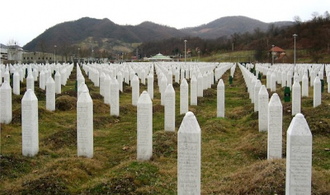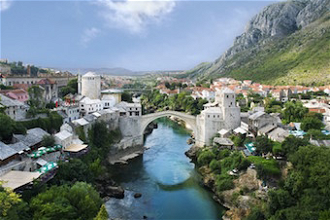Sarajevo: Archbishop remembers victims of Srebrenica massacre

Gravestones at the Potočari genocide memorial near Srebrenica. Wiki image.
Source: Vatican News
On the 28th anniversary of the Srebrenica massacre yesterday, Archbishop Tomo Vuksic expressed his closeness to the families of the victims of the mass killings, saying the graves of the victims "preach peace" in today's world.
Srebrenica became a global symbol of suffering and genocide as a result of the horrendous attack by Bosnian Serb forces in July 1995.
Ignoring a Security Council resolution that declared Srebrenica a safe, protected area, during the presidency of Radovan Karadžić, the Bosnian Serb army, under the command of General Ratko Mladic, attacked the city, and after placing the women, children, and elderly aboard buses directed to Bosniak-held territory, executed some 8,000 Bosniak (Bosnian Muslim) boys and men.
Some killings occurred on the evening of July 12, but mass evacuations of mostly blindfolded Bosnian men to execution sites began in earnest on the evening of July 13. It was discovered later that many of the victims of the massacre had had their arms and feet bound. Many of the bodies also showed signs of mutilation.
In addition to the killings, more than 20,000 civilians were expelled from the area while over 6,000 homes mosques, schools, factories and infrastructure were torched.
The massacre, which was the worst episode of mass murder within Europe since World War II, helped galvanize the West to press for a cease-fire which led the 1995 Dayton Accords ending three years of warfare in the former Yugoslavian republic.
However, the war has left deep emotional scars on survivors and enduring obstacles to political reconciliation among Bosnia's three main ethnic groups: Croatian, Serb and Bosnian.
The International Criminal Tribunal for the Former Yugoslavia, established before the massacre to scrutinize ongoing military conduct, concluded that the Srebrenica slayings, compounded by the mass expulsion of Bosnian civilians was genocide.
It placed the principal responsibility on senior officers in the Bosnian Serb army, but the United Nations also accepted a portion of the blame for having failed to protect the Bosnian civilians.
In a message issued on the eve of the 28th anniversary of the massacre commemorated annually on 11 July, the Archbishop of Sarajevo, Tomo Vuksic, expressed his deep condolence to all those mourning their loved ones who perished in the killings, underlining how "each victim was a father or mother, brother or sister, son or daughter, wife or husband, boyfriend or girlfriend, someone's friend or acquaintance".
He concluded: "For the rest of us, they are our brothers and sisters whose life was taken away, so our fraternal compassion towards them is sincere".
The Archbishop of Sarajevo mentioned particularly the families of those whose remains will be buried only this year, after being exhumed from more mass graves and whose identification hadn't been completed until recently.
Archbishop Vuksic said the graves of the victims are "great messengers of peace" who "demand that every life be respected and preserved". This is "their greatest message and lesson for all."
The message concludes with a prayer to God, "our merciful creator and only Lord of life" so that "He may grant all the deceased eternal life" while "hope may be born of the sorrow of the living".
Since the 1995 Srebrenica massacre, the government of the Republika Srpska (now formally part of Bosnia and Herzegovina) issued an apology in 2004 and acknowledged that an estimated 7,800 were murdered. Also Serbian President Tomislav Nikolić issued an apology in April 2013 although he didn't call it genocide.
Over the years the UN criminal tribunal indicted more than 20 people for their involvement, several of whom were condemned. In 2016 Karadžić was found guilty of genocide, as well as nine other war crimes and crimes against humanity, and sentenced to 40 years in prison, while in 2017 Mladić was sentenced to life imprisonment for genocide, war crimes, and crimes against humanity.

















